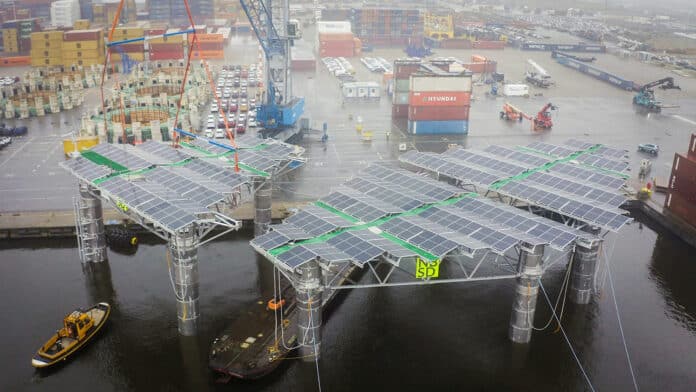Bureau Veritas (BV) has awarded the Dutch-Norwegian renewable energy company SolarDuck the world’s first Prototype Certification for a floating offshore solar technology. The certification is for the company’s 0.5 MW “Merganser” offshore floating solar pilot.
The Merganser project, which has been developed by SolarDuck and supported by RWE, features an offshore floating solar pilot with a capacity of 520 kWp. It consists of six interconnected platforms and has been designed to withstand harsh offshore conditions, including high waves, strong winds, and corrosive environments.
The project has been certified to withstand a maximum wave height of 11.6 meters at a water depth of 21.5 meters at the North Sea Farmers test site. It will deployed in a real-world operational environment in the North Sea, off the coast of The Hague, Netherlands, to evaluate its performance and resilience in the dynamic North Sea.
In a world rapidly transitioning to electrification, escalating global population and urbanization are causing a shortage of land for energy infrastructure. Consequently, the demand for offshore energy generation is on the rise. SolarDuck has developed a groundbreaking technology that can be utilized in regions with limited wind resources but abundant sunlight, serving as standalone offshore floating solar farms.
Additionally, the versatility of SolarDuck’s technology allows for its integration with offshore wind projects, as exemplified in the upcoming deployment in the Dutch North Sea. The overarching goal of SolarDuck is to make a substantial impact by displacing conventional fossil fuel-based energy sources such as coal-fired power plants and diesel generators. Beyond that, this innovative technology empowers islands, offshore installations, and even entire countries to establish independent and sustainable renewable energy sources.
Bureau Veritas has been actively supporting SolarDuck in its pioneering efforts to develop floating solar solutions. The certification of the Merganser prototype is definitely a significant achievement for SolarDuck, following the Approval in Principle (AiP) granted for its floating structure.
Bureau Veritas thoroughly evaluated the prototype against rules and standards during the certification process, including guidance note NI631 on the Certification Scheme for Marine Renewable Energy Technologies. The assessments covered various aspects such as the floating structure, mooring system, stability analysis, materials, and electrical safety systems. The technology will be further evaluated for a type certification in the next phase.
“A key step in making the technology bankable is obtaining certification of the technology,” said Don Hoogendoorn, CTO of SolarDuck. “As long-standing partners, SolarDuck has cooperated closely together with Bureau Veritas to verify the technology for the harsh North Sea conditions, marking a significant milestone in the development of our offshore floating solar technology.”
“Our expertise in assessing structural integrity and conducting design evaluations played an important role in meeting technical standards, highlighting our commitment to fostering innovation while ensuring safety and reliability in offshore renewable energy projects,” says Martijn Nieuwenhuijs, Country Chief Executive, Bureau Veritas Marine & Offshore Netherlands.
